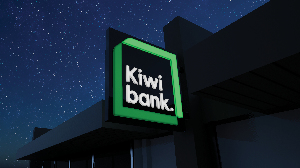That has lifted Kiwibank's market share to almost 7.6% at June 30, up from less than 7.2% a year earlier, according to the Reserve Bank's bank financial strength dashboard data.
Kiwibank's mortgage book at June 30 stood at $26.95 billion, up from $24.55 billion a year earlier.
It's unlikely a coincidence that Kiwibank's growth spurt followed the July 2023 additional capital of $225 million it received from the proceeds of the sale of Kiwi Wealth, and chief executive Steve Jurkovich acknowledged as much when Kiwibank reported its annual results last month.
While ASB Bank continued to lift mortgage lending to $586.5 million in the June quarter from $380.7 million in the March quarter, it is still lending at a rate less than its market share, accounting for 17.7% of net new mortgage lending by registered banks in the latest quarter.
ASB's market share at June 30 was 20.9%, down from 21.6% a year earlier, because its net new mortgage lending in the year of $503 million represented only 3.9% of total new mortgage lending by banks in the year.
ASB's owner, Commonwealth Bank of Australia chief executive Matt Comyn, was quoted last year as fretting about margins, particularly in NZ, and it's clear that was ASB's motivation in stepping back from the mortgage market last year and failing to offer competitive mortgage lending rates.
New Zealand's largest bank, ANZ, also grew its mortgage book at a slower pace than its market share in the latest quarter, accounting for 28.2%, or $931.8 million, of net new lending in the June quarter compared with its market share of 30.4% at June 30.
However, ANZ's annual growth in mortgages of nearly $4.49 billion accounted for about 35.1% of net new mortgage lending by registered banks in the year ended June 30.
ANZ's mortgage book stood at $108.15 billion at June 30, up from $103.66 billion a year earlier.
National Australia Bank-owned Bank of NZ is growing mortgage lending faster than its market share of 16.8% at June 30, with its net new lending of $777.2 million in the June quarter accounting for 23.5% of banks' total new mortgage lending in the quarter.
In the year ended June, BNZ lent nearly a net $2.43 billion, accounting for 19% of net new bank mortgage lending, and taking its mortgage book to $59.59 billion, from $57.16 billion a year earlier.
Westpac pulled in its horns in the June quarter, its net new mortgage lending of $246.5 million accounting for just 7.5% of net new lending by registered banks in the quarter compared with its market share of 18.9% at June 30.
Westpac was somewhat more active in the year ended June, securing $1.77 billion in net new mortgages, or 13.9% of total net new mortgage lending by registered banks.
Westpac's mortgage book stood at $67.21 billion at June 30 compared with $65.44 billion a year earlier.

![[TMM Podcast] Yelsa serves up “marine reserve” of property buyers](https://www.goodreturns.co.nz/pics/mike%20harvey.jpg)



 Search
Search
